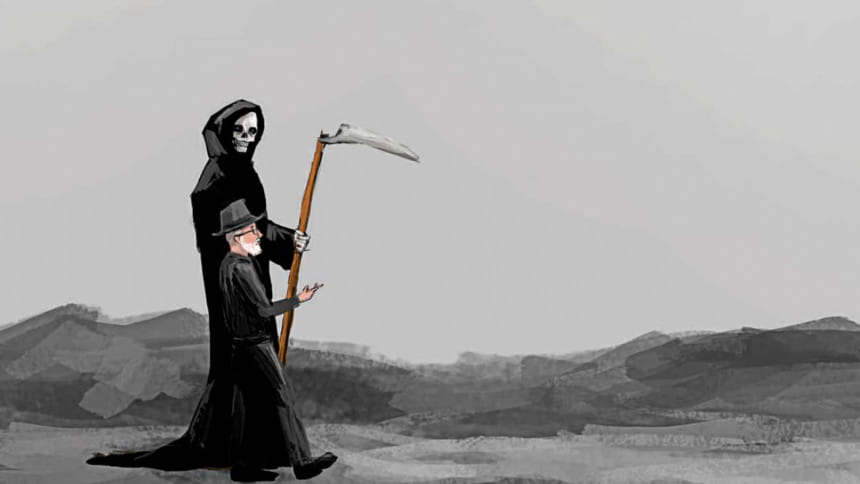DON'T FEAR THE REAPER

"No one is finally dead until the ripples they cause in the world die away — until the clock he wound up winds down, until the wine she made has finished its ferment, until the crop they planted is harvested. The span of someone's life, they say, is only the core of their actual existence."
― Terry Pratchett, Reaper Man
On March 12, 2015, Sir Terry Pratchett passed away in his home, the result of the Alzheimer's he'd been diagnosed with in 2008. The death of a beloved author is always hard on fans, but Sir Terry had a unique relationship with Death, who appears as a character in almost all of the books in his Discworld series.
In the Discworld, Death is portrayed as the classic black-robed reaper, but with a personality. He is lonely. He is curious about life and the things we do. He likes cats. He is polite, professional. He loves his granddaughter. He TALKS LIKE THIS. Pratchett's departure was announced on his twitter account in the voice of Death:
AT LAST, SIR TERRY, WE MUST WALK TOGETHER.
In a turn of events that would have amused Sir Terry, thousands of his fans have since signed a Change.org petition asking Death to give him back to us. Quoting him: "There are times in life when people must know when not to let go. Balloons are designed to teach small children this."
He was an enormously successful writer, Discworld alone having sold more than 75 million copies worldwide. Yet this success was hard-won, and in many respects his reader-base has been a steadily-growing cult. Due to misconceptions about what he wrote, mainstream recognition of his work has been slow in coming, and still insufficient. Pratchett was ostensibly a fantasy satirist, which is one of the worst combinations of labels one can have if they wish to be taken seriously.
Humour is seen as low and dirty in contemporary culture and not worth proper critical or scholarly attention (as an example from another medium, no one has ever won an Academy Award for comedic work). And fantasy as a genre has for the longest time been seen as niche, which has only recently turned around with the success of The Lord of the Rings films, Harry Potter and HBO's Game of Thrones. Yet few discussions of contemporary authors who are culturally significant – authors with a rich understanding of human nature, authors who wrote cleverly –indeed any discussion of contemporary literature would be unlikely to so much as touch upon Terry Pratchett. It is the price of writing about flat worlds on the backs of cosmic turtles. The value of a writer is, inexplicably, inversely proportional to their love for silly names.
The tragedy of it is this: Sir Terry Pratchett was until recently the greatest living author. It is a bold claim, but one we are prepared to defend.
Fantasy as a genre is often beholden to the 'rules', set down by Tolkien. Hence the emergence of the 'standard fantasy setting', which is something we have come to accept to such a degree that we do not recognise it for the oxymoron that it is. For fantasy is, by definition, about the unreal. A fantasy writer has the freedom, should they realise it, to mould their world to any whim, and Pratchett was the master at using fantasy to get his point across.
He created the Discworld – world, and mirror of worlds – initially to mock the tropes of the genre, but it became more than that. A man with an insatiable desire to learn, Sir Terry would use the Disc as metaphor to tackle almost every topic under the sun. He discussed rock music, the telecommunications industry, the nature of belief, religious institutions, fatherhood, sexism, jingoism, racism, revolution, power and government, love, loneliness and mortality. It may be a stretch to call him a philosopher for much of the ideas he discussed were not original to him, but his talent lay in placing complex, abstract concepts in surprising contexts (is a democracy of fools better than a brilliant dictator? If you die but come back from the grave, do you still have legal claim over your property?), thereby revealing their lessons with wit and clarity.
He was no mere summariser of others' work, of course: his gift for seeing clearly into the truth of things was coupled with a humour that was as biting as it was kind. Pratchett understood. Few writers have written so intelligently and comprehensively on the human condition, and even fewer have done so using wizards and dragons. He has demonstrated fantasy's power as a tool for social criticism, and it's going to be some time before the importance of his work fully sinks in.
Most writers with big ideas are lightweights when it comes to writing character and dialogue (Asimov, Crichton come to mind). Not Pratchett. He peopled his books with unforgettable personalities, ranging from the incompetent wizard, Rincewind, to the unhinged assassin, Mr. Teatime. Possibly Pratchett's finest creation (more so than even Death) is Sam Vimes, Commander of the Ankh-Morpork City Watch. An anti-authoritarian former alcoholic, Vimes in many books seems to have a death wish. He holds onto life because he loves his family and believes in justice and he will see it done. He arrested a dragon. He stopped a war by arresting the high commands of both armies, for breaching the peace. Infinitely fallible and infinitely determined, Vimes is the ultimate cop, and with Death, deserves a place in popular culture.
Pratchett wrote on average two novels a year, even until the very end. And he wrote novels that were not only smart and funny, but also true. Literature has lost one of its greatest contributors, though he regularly joked that he 'refrained from writing any'. It's hard to believe that he is gone, though his fans had long expected it. At least we know that he is now in the good hands of an old friend.

 For all latest news, follow The Daily Star's Google News channel.
For all latest news, follow The Daily Star's Google News channel. 



Comments